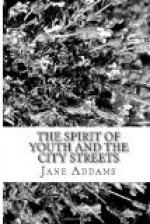Three boys, aged nine, eleven and thirteen years, who had recently seen depicted the adventures of frontier life including the holding up of a stage coach and the lassoing of the driver, spent weeks planning to lasso, murder, and rob a neighborhood milkman, who started on his route at four o’clock in the morning. They made their headquarters in a barn and saved enough money to buy a revolver, adopting as their watchword the phrase “Dead Men Tell no Tales.” One spring morning the conspirators, with their faces covered with black cloth, lay “in ambush” for the milkman. Fortunately for him, as the lariat was thrown the horse shied, and, although the shot was appropriately fired, the milkman’s life was saved. Such a direct influence of the theater is by no means rare, even among older boys. Thirteen young lads were brought into the Municipal Court in Chicago during the first week that “Raffles, the Amateur Cracksman” was upon the stage, each one with an outfit of burglar’s tools in his possession, and each one shamefacedly admitting that the gentlemanly burglar in the play had suggested to him a career of similar adventure.
In so far as the illusions of the theater succeed in giving youth the rest and recreation which comes from following a more primitive code of morality, it has a close relation to the function performed by public games. It is, of course, less valuable because the sense of participation is largely confined to the emotions and the imagination, and does not involve the entire nature.
We might illustrate by the “Wild West Show” in which the onlooking boy imagines himself an active participant. The scouts, the Indians, the bucking ponies, are his real intimate companions and occupy his entire mind. In contrast with this we have the omnipresent game of tag which is, doubtless, also founded upon the chase. It gives the boy exercise and momentary echoes of the old excitement, but it is barren of suggestion and quickly degenerates into horse-play.
Well considered public games easily carried out in a park or athletic field, might both fill the mind with the imaginative material constantly supplied by the theater, and also afford the activity which the cramped muscles of the town dweller so sorely need. Even the unquestioned ability which the theater possesses to bring men together into a common mood and to afford them a mutual topic of conversation, is better accomplished with the one national game which we already possess, and might be infinitely extended through the organization of other public games.
The theater even now by no means competes with the baseball league games which are attended by thousands of men and boys who, during the entire summer, discuss the respective standing of each nine and the relative merits of every player. During the noon hour all the employees of a city factory gather in the nearest vacant lot to cheer their own home team in its practice for the next game with the nine of a neighboring manufacturing




